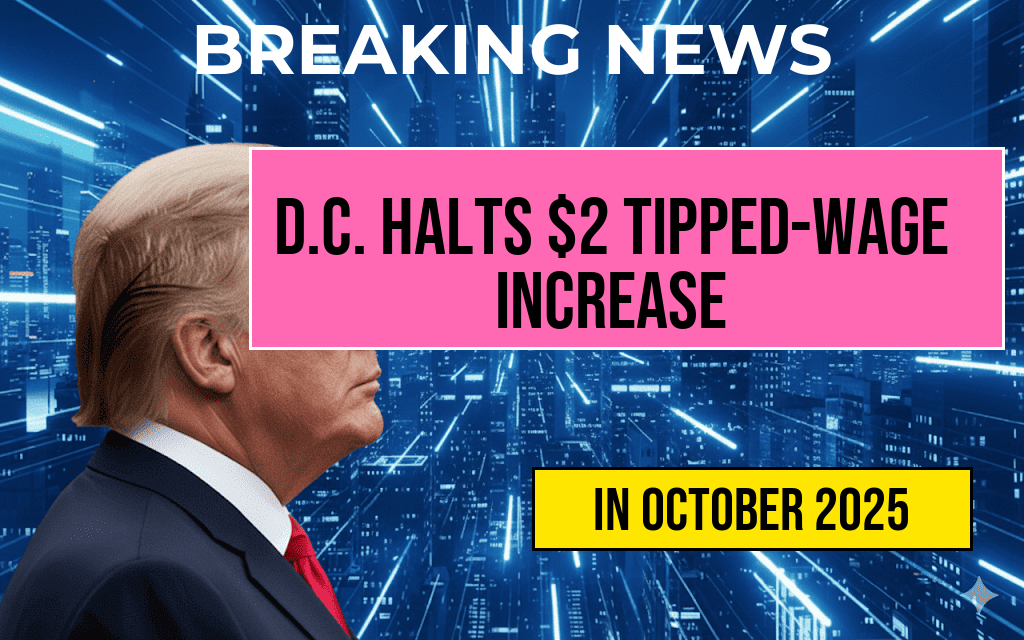Washington D.C. Temporarily Halts $2 Tipped-Wage Increase, Potentially Costing Servers Up to $4,160 Annually Compared to Original Plan
Washington D.C. has paused a planned increase to its tipped minimum wage, a move that could leave many restaurant servers earning significantly less than initially projected. The city originally aimed to raise the tipped wage by $2, from $5.35 to $7.35 per hour, as part of a broader effort to improve wages for hospitality workers. However, recent legislative delays mean this increase will not take effect immediately, potentially reducing annual earnings for tipped employees by as much as $4,160 compared to previous expectations. The decision has sparked debate among restaurant owners, workers, and advocates, highlighting ongoing tensions between wage policies and economic stability within the service industry.
Background on D.C. Tipped Wage Policy
Historically, the tipped minimum wage in Washington D.C. has lagged behind the standard minimum wage, creating disparities that often place service workers at financial risk during slow shifts or downturns. The city’s plan, announced earlier this year, was to incrementally increase the tipped wage to align more closely with the regular minimum wage, which is currently $16.25 per hour. Advocates argued that the phased increase would bolster income stability for servers, bartenders, and other tipped workers while maintaining flexibility for restaurant owners.
Legislative Halt and Its Implications
However, legislation introduced by D.C. lawmakers to implement the wage hike was temporarily stalled in late September due to procedural delays and opposition from some business groups concerned about rising operational costs. This pause effectively delays the first $2 increase, pushing the timeline for full implementation further into the future. As a result, workers who rely on tips face a potential shortfall in earnings, especially during busy seasons or special events where tips constitute a significant portion of income.
Economic Impact on Servers
| Scenario | Hourly Wage | Estimated Annual Income (40 hours/week, 52 weeks) | Difference Compared to Original Plan |
|---|---|---|---|
| Original Wage Increase (from $5.35 to $7.35) | $7.35 | $15,288 | — |
| Current Halted Wage (remains at $5.35) | $5.35 | $11,128 | $4,160 |
This calculation underscores how the delay could result in a systemwide income shortfall for servers, especially those who rely heavily on tips. For many, this could mean losing thousands annually, which may influence their ability to meet living expenses or save for future needs.
Stakeholder Reactions and Broader Context
Restaurant industry representatives express concern that the delay could exacerbate staffing shortages, as lower wages may make service roles less attractive. Conversely, labor advocates argue that postponing the wage hike undermines efforts to improve economic equity among service workers. “This halt stalls progress toward fair wages and leaves many workers vulnerable,” said Maria Lopez, a labor rights advocate based in D.C.
Meanwhile, some small business owners worry about the financial strain of upcoming wage increases amid inflationary pressures. “Every dollar counts when margins are thin,” said James Carter, owner of a downtown diner. “Delaying the increase gives us more time to adapt, but it also leaves our employees earning less than they deserve.”
Legal and Political Dynamics
The legislative pause reflects broader political debates over minimum wage policies across the country. State and municipal governments are often caught between economic recovery initiatives and the political pressures to keep costs manageable for small businesses. According to Wikipedia’s overview of minimum wages in the U.S., many cities experiment with phased increases, yet delays and rollbacks remain contentious issues.
Washington D.C. officials have indicated they intend to revisit the wage increase in upcoming legislative sessions, emphasizing their commitment to eventually implementing the phased rise. However, the timing remains uncertain, and the current pause highlights the complex balancing act involved in wage policy decisions.
Looking Ahead
As D.C. navigates this pause, workers and industry stakeholders are watching closely. The city’s decision underscores the ongoing debate over how best to support service workers while maintaining a thriving hospitality sector. For servers, the immediate concern is the potential loss of hundreds of dollars in annual income, which could influence their financial stability and job satisfaction.
Consumers and advocacy groups continue to push for transparent, equitable wage policies that recognize the contributions of tipped workers. As discussions unfold, the hope remains that D.C. will soon find a path to reinstate the phased wage increase, ensuring that service industry employees receive fair compensation for their work.
For more insights into minimum wage policies across the U.S., visit Wikipedia’s minimum wage overview or consult reports from Forbes for industry-specific impacts.
Frequently Asked Questions
What is the main change to the tipped-wage increase in D.C.?
The District of Columbia has temporarily halted the planned $2 increase in the tipped minimum wage, which may affect servers’ earnings.
How much could servers potentially lose annually due to this change?
Servers could potentially lose up to $4,160 annually compared to the original plan that included the $2 wage increase.
When was the tipped-wage increase originally scheduled to take effect?
The $2 wage increase was scheduled as part of a planned phased increase in the tipped minimum wage, which has now been temporarily halted.
What are the reasons behind the halt of the wage increase?
The halt was implemented due to administrative or legislative considerations, aiming to review or delay the wage increase plan for now.
How might this decision impact service industry workers in D.C.?
This decision could reduce income for servers and tipped workers, potentially impacting their financial stability and overall earnings in the short term.

Leave a Reply